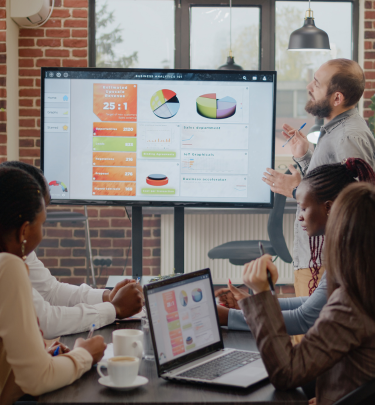This website uses cookies so that we can provide you with the best user experience possible. Cookie information is stored in your browser and performs functions such as recognising you when you return to our website and helping our team to understand which sections of the website you find most interesting and useful.
December 15, 2023
Well-being and diversity are critical topics in the legal sector, and their intersection is becoming increasingly important. It was fitting that a panel of leading experts in diversity, inclusion and well-being joined together for the final Legal Office and Administration Forum (LOAF) of 2023; sharing insights and experiences on a range of topics, including the challenges and priorities for law firms, the impact of the workplace on well-being, and the importance of inclusive design.
Alexis Caught, a leading law firm consultant in equality, diversity, inclusion and well-being strategies, Caroline Turner-Inskip, Partner and Global Head of Wellbeing at Simmons & Simmons, Fiona Fleming, Senior Diversity and Inclusion Manager at Farrer & Co, and Beth Try, Senior Diversity and Inclusion Adviser at Herbert Smith Freehills, were part of the glittering virtual panel chaired by Chris Bull.
Here are the top three crucial insights that emerged from the panel discussion:
Education and training in well-being and diversity are crucial for creating a culture of inclusion
Across the panel, there was a consensus that well-being is not a soft and fluffy concept, but a critical component of a high-performing and inclusive organization. The speakers argued that well-being should be embedded into the culture of a workplace, rather than being seen as a separate initiative. They also emphasized the importance of training line managers to create a psychologically safe environment for their teams. “Mental well-being is actually very important. It’s something that people need real tools to deal with and in particular, within legal, genuine support, because there are challenges in that,” said one of the panelists. Another panelist argued against the term “soft skills,” because it trivializes the importance of well-being and leadership development taking the view that these skills are not “soft” or fluffy, but rather essential for high-performance and a positive work environment. She added that the term is often used to dismiss or downplay the importance of these skills, saying “We need to reach out to specialists who really know what they are talking about and bring a knowledge to this that ensures that we embed well-being and that it isn’t just yoga, and have you eaten an orange for lunch rather than a bag of crisps.”
Instead of using the term “soft skills,” more specific and descriptive language should be used, such as “people skills,” “communication skills,” “emotional intelligence,” and “leadership skills.” This more precise language helps to better convey the importance and value of these skills.
Inclusive design in the workplace is essential for accommodating law firm employees’ diverse needs
Inclusive design is a philosophy that prioritizes creating physical environments that benefit all individuals. This concept is particularly crucial in the workplace, where it can have a positive impact on employees. By incorporating inclusive design principles, law firms can establish adaptable workspaces that cater to the unique needs of various employees and foster a more inclusive work environment. Moreover, it is essential for law firms to be cognizant of how they convey inclusivity to their employees, as this can help foster a more welcoming and supportive work environment.
By considering the diverse needs of all law firm employees and creating a welcoming and accommodating workplace environment, law firms can improve employee engagement, productivity, and retention. A speaker on the panel highlighted the importance of creating spaces that are open, comfortable, and capable of delivering for all people, as well as the need to think about not just the carbon footprint of the building, but how it can be a safe space for people to operate in. “When I look at the sort of ESG (Environmental, Social, and Governance) agenda… this is all about the ‘S’,” they said. “How do we make our buildings more socially capable of delivering for all people …having space within buildings that think about the human being in them. We often think of buildings on how they’re impacting the environment, so the ‘E’ part, how much heating, what’s the lighting? I think we will very much start to see a drive towards our buildings, thinking about the people in them far more fundamentally.”
Another panelist highlighted that building an inclusive workplace doesn’t need to break the budget: “There are always budget constraints, particularly in DE&I and well-being departments. That’s not new information, but there are so many things that you could do that don’t require significant firm wide investment to make your workplaces better for people. Sometimes the really small things can help.” These could be things such as more plants, positive color schemes, and different types of spaces to cater to different people’s work style. “No person is the same” said another panelist. “We’re all so unique. We all have different ways in that we’d like to work and engage with people… there needs to be a range of options and flexibility.”
Leadership plays a vital role in promoting well-being and diversity.
It’s no mystery that for well-being and diversity to be meaningful, law firm leaders need to be role models and show their employees how to look after themselves. One of the panelists talked about a partner well-being program their firm had established. The program created dissent because some colleagues felt that it should focus on associates or business services support staff. “My answer to that is very much you can’t look after other people until you know how to look after yourself,” said the panelist. “We are really pushing and driving the leadership of our law firms to lead by example. It would be nice if when our partners went on holiday, they did what they said they were going to do, not spend their entire time sitting on the beach on a laptop. It’s important to try and get the leadership of law firms really looking after themselves, so that they understand how to look after others.”
Another panelist pointed out that law firm leaders will have to make tough decisions when looking at the ways their practices and processes are working against the demands of their lawyers. “My dream would be to wave a magic wand and get rid of billable hours as a model because I think it is an absolute killer to any type of healthy life. I know that that is a pipe dream because we are working with a centuries old industry and it is very difficult to dismantle,” they said. “But this goes back to focusing on DE&I education around what we mean when we talk about all of the different facets of well-being and DE&I, creating a consistent language and getting them comfortable with talking about these things… that’s really where it starts.”
Learn more about the changing landscape of law firms: Download the future of the legal workplace to stay up to date on the factors reshaping the industry.
Share
Insights
Case studies
Driving client growth and success through highly skilled business-critical support services

















